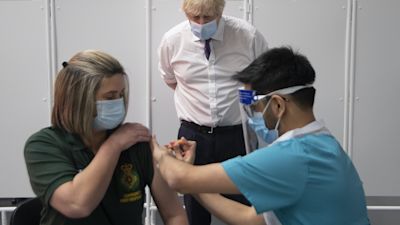Covid vaccine 'doing the job' to cut cases, according to Bristol expert

Vaccines are "doing the job" when it comes to cutting the number of people infected with Covid-19 across the UK, a top scientific adviser has said.
Professor Adam Finn, from the University of Bristol and a member of the Joint Committee on Vaccination and Immunisation (JCVI), said "everything's moving in the right direction" when it comes to the impact of vaccines on the pandemic.
His comments were echoed by Professor Neil Ferguson, from Imperial College London and a key figure in ensuring the UK went into lockdown last March, who said while it was still "early days", a figure of two-thirds efficacy from a single dose of a vaccine was "not too far off".
Public Health England (PHE) is due to publish data shortly which shows the effectiveness of the current vaccination programme.
Prof Finn told BBC Radio 4's Today programme: "It's just hard to put an exact number on it at this point because... the numbers of cases coming through are still building up, the number of people who've been vaccinated are still going up.
"But it's becoming clearer for the Pfizer vaccine, which we've been using for a month longer, since early December...
"It'll take slightly longer for us to get a firm handle on just how well the AstraZeneca vaccine is preventing hospitalisations too, but they're definitely doing the job."
Prof Ferguson said data on vaccine effectiveness and how quickly infection, deaths and hospital cases were declining across the country was looking promising.
But he added: "The trade-off we have is between how quickly can we relax, and how quickly we can immunise and protect the population.
Emotional moment couple who fought Covid side by side in hospital are discharged
Bristol Covid case rate going down as date to end surge testing set
"And there's still risks at the moment in relaxing too quickly when we don't have enough immunity in the population bearing in mind that no vaccine is a panacea, no vaccine will offer perfect protection."
Prof Ferguson told BBC Radio 4's Today programme he thought lockdown should be lifted in stages, adding the "downside of taking bigger risks is you risk having to lock down again which is even more disruptive economically and socially".
He added: "I am encouraged by the cautious approach being taken, an incremental approach which I think will be adopted, namely relax one thing and see what the impact is, relax again."
He added: "There are threats out there, we don't know for instance quite how effective the vaccines are, how long immunity will last, there is the threat of variants," he said.
"So we have to be driven by the data and the trends we see."
Prof Ferguson, who said he had not yet booked a holiday, said people would be isolating "forevermore" if the desire was to eliminate Covid-19.
"We're not going to eliminate globally so we won't eliminate here," he said.
"I would like to see this virus become like influenza and managed in similar ways.
"And I think the one thing this pandemic has generated is a whole new generation of vaccines which frankly are much more effective than the influenza vaccines we typically use year to year.
"And so I think long-term we do have very promising prospects for pulling down the burden of disease, the mortality caused by this virus, quite dramatically."
Listen to ITV News' coronavirus podcast
Read more: